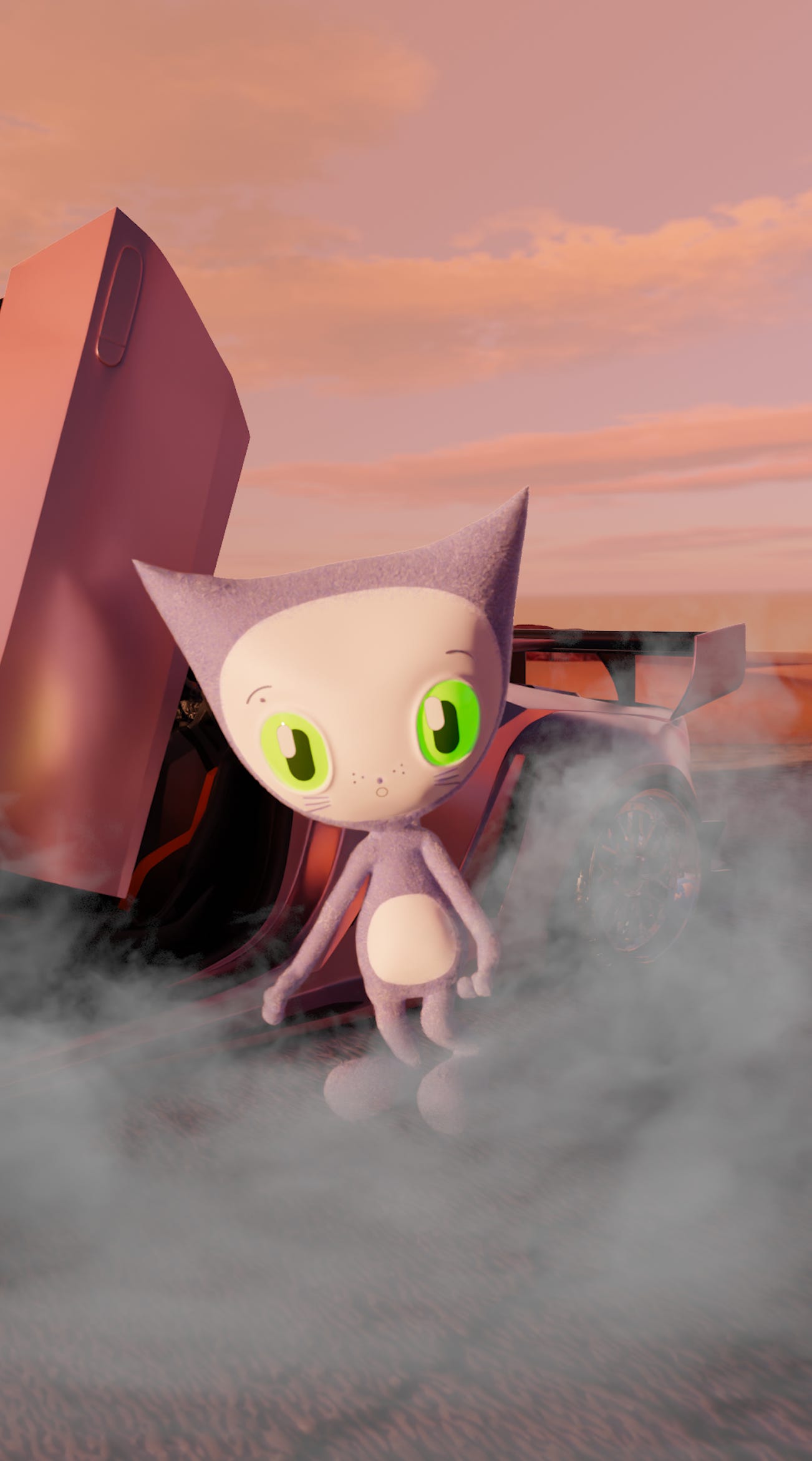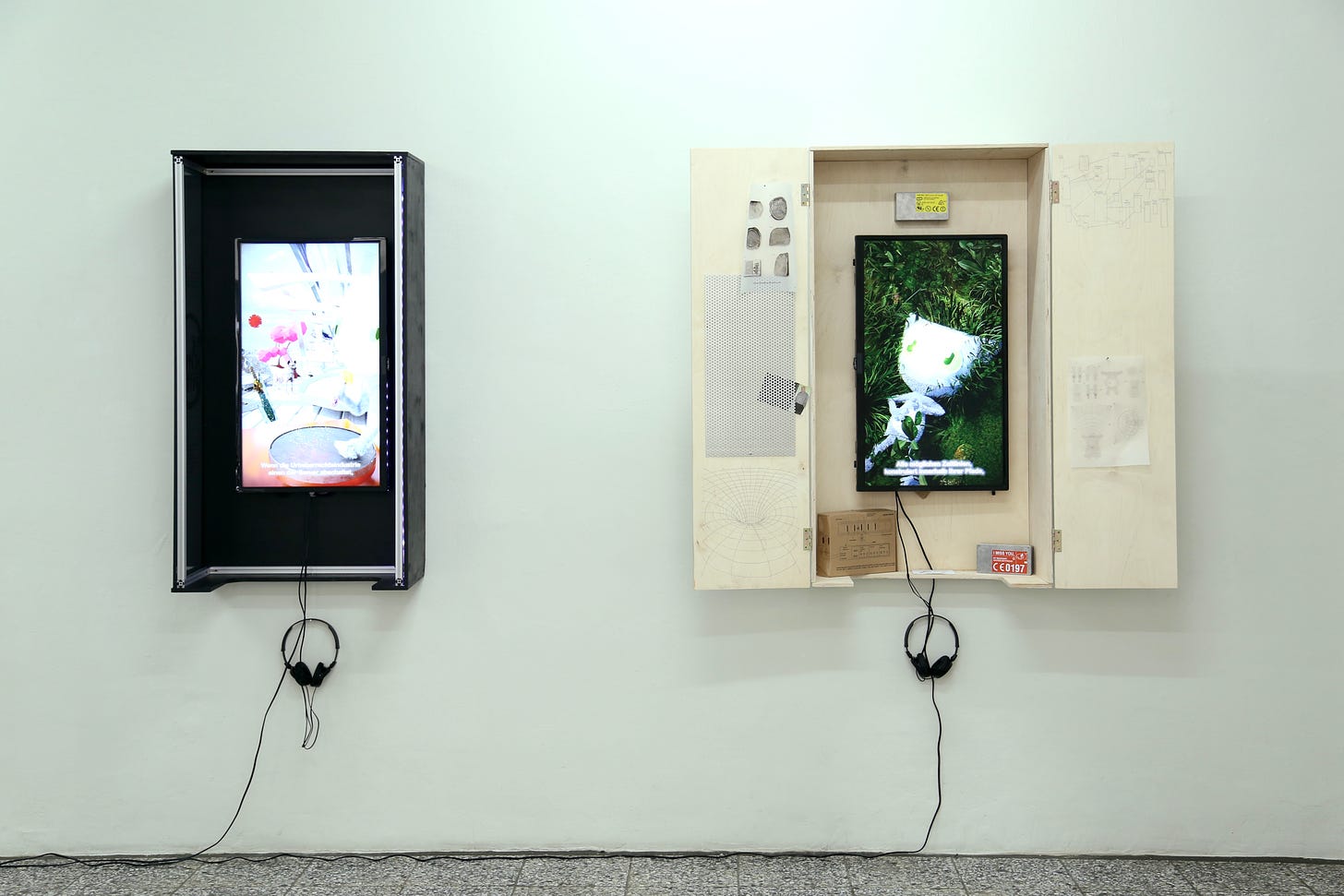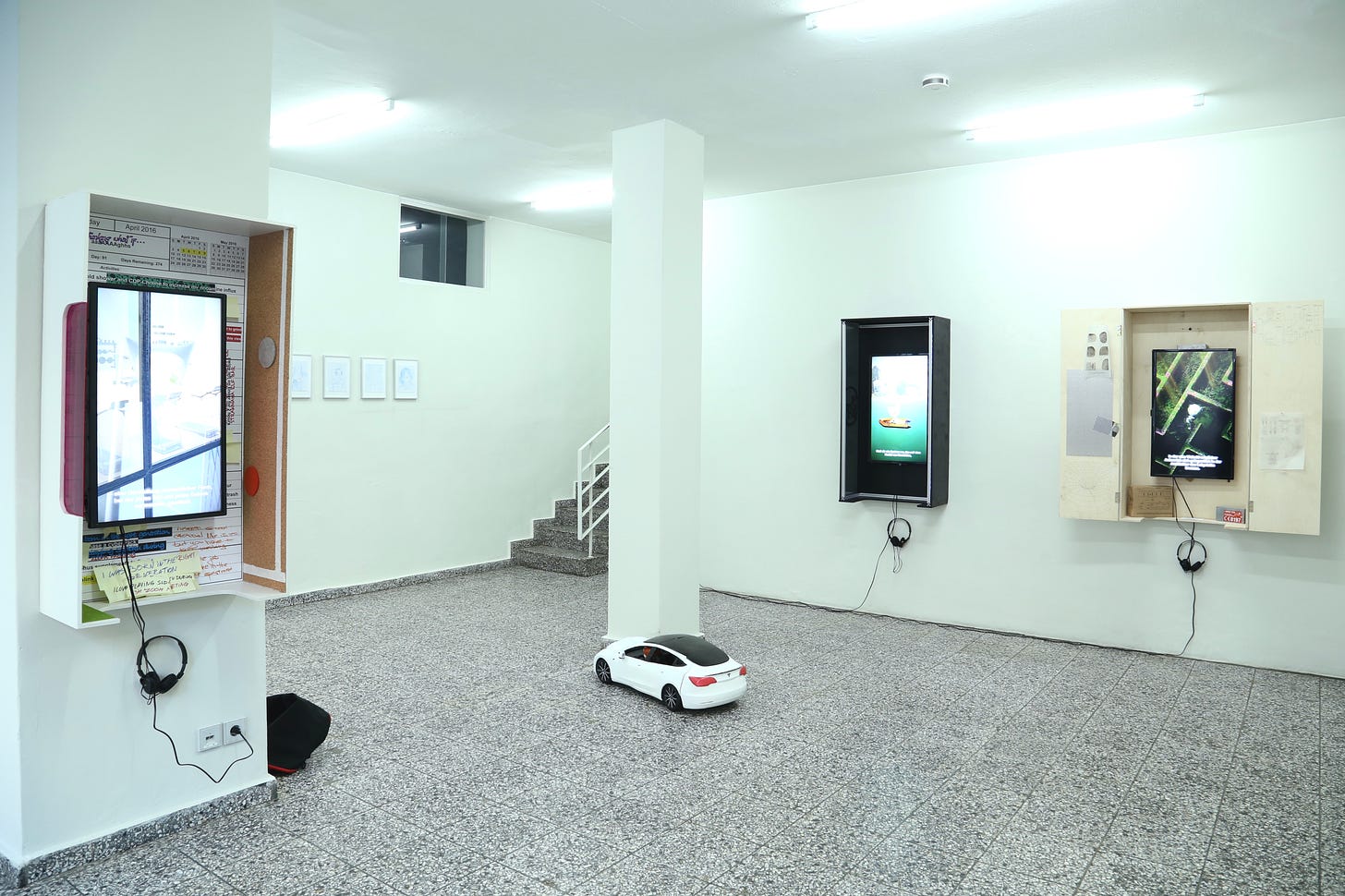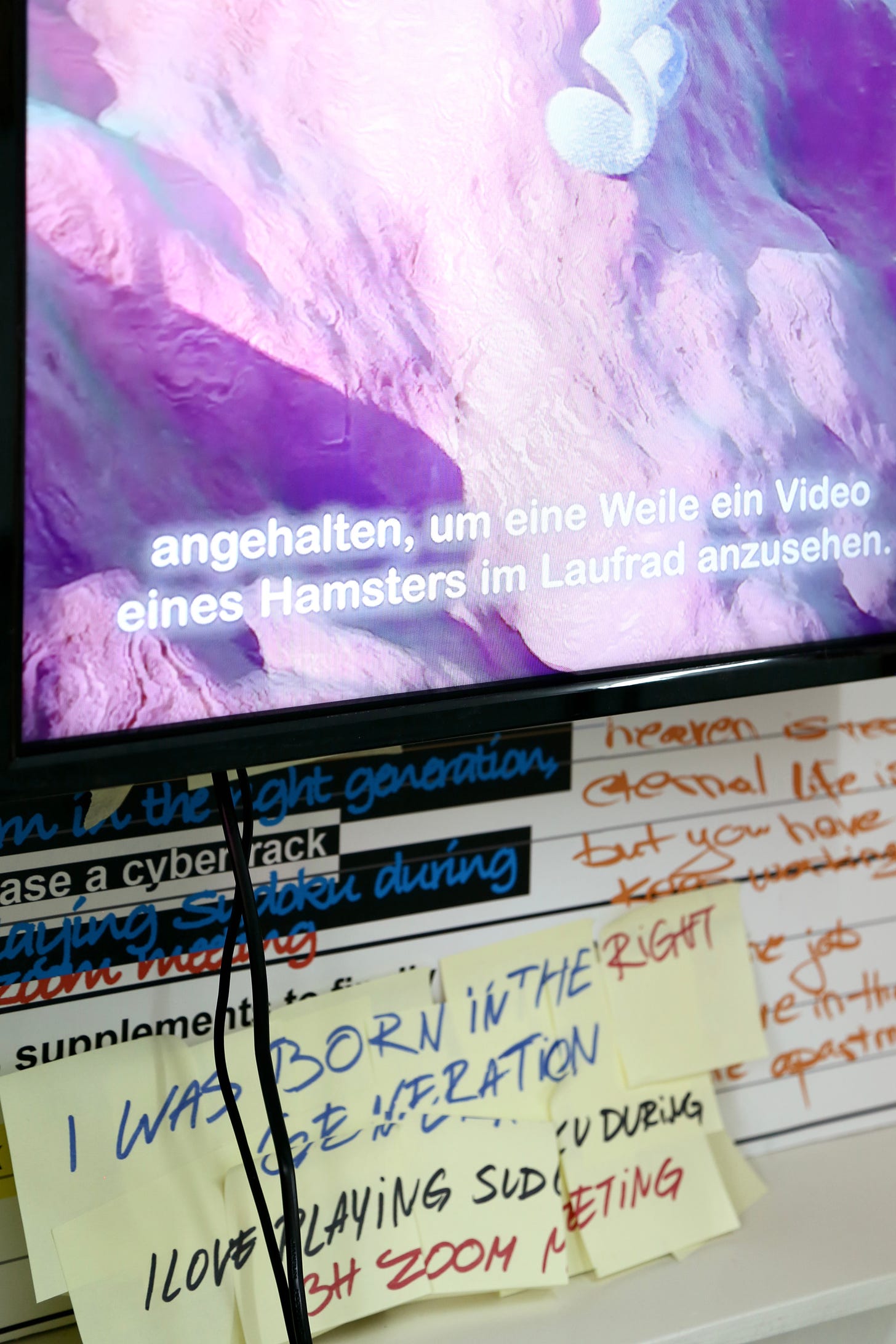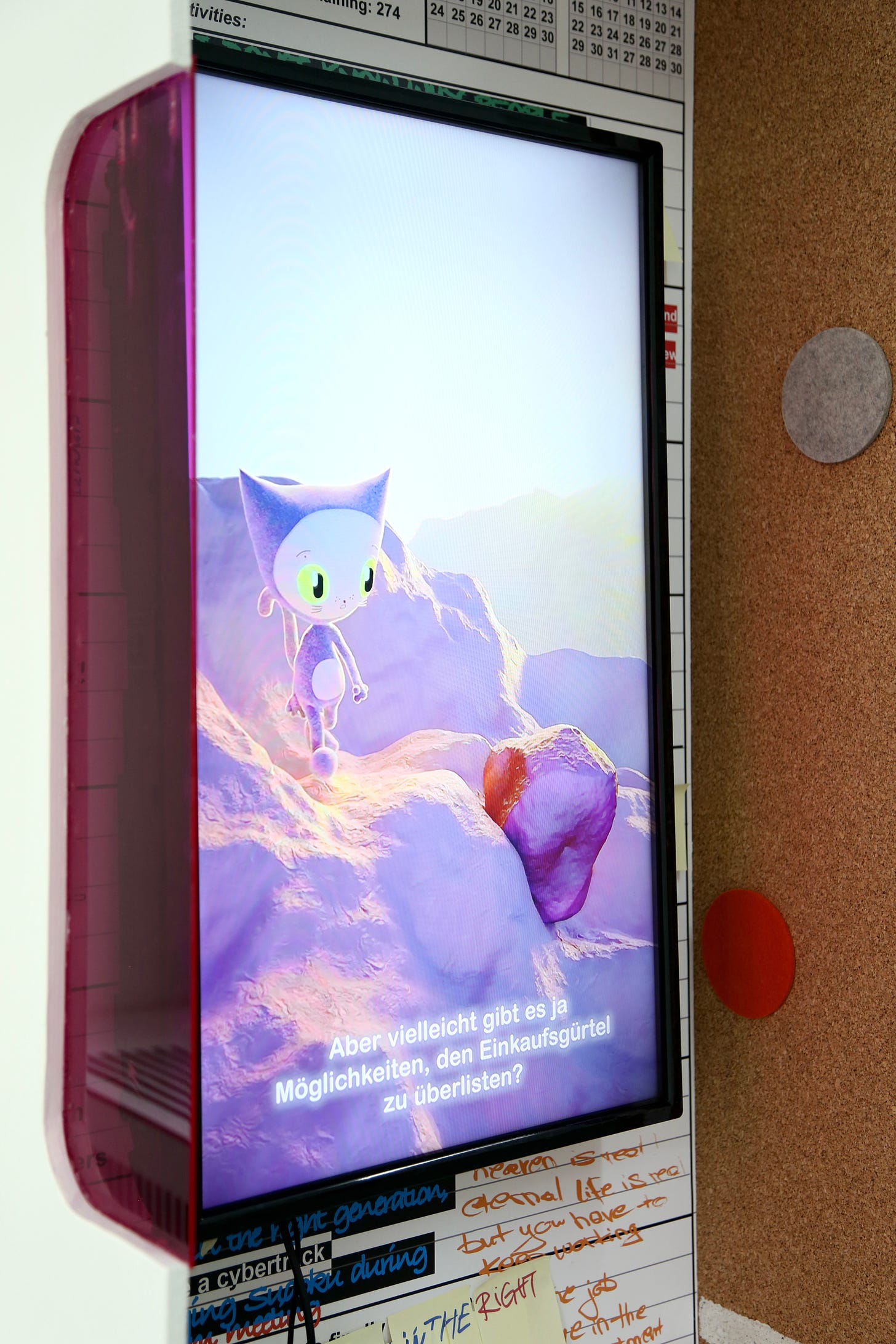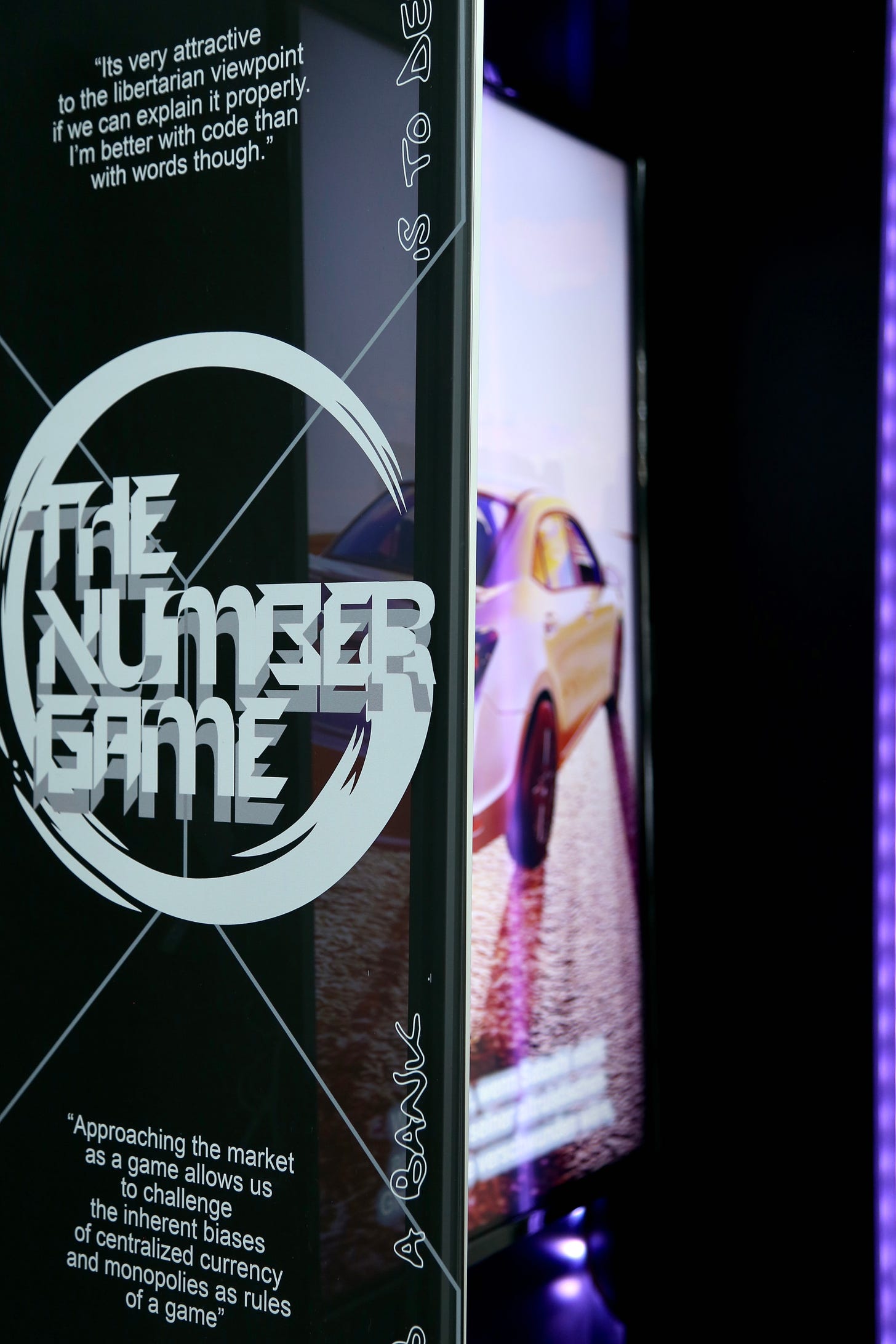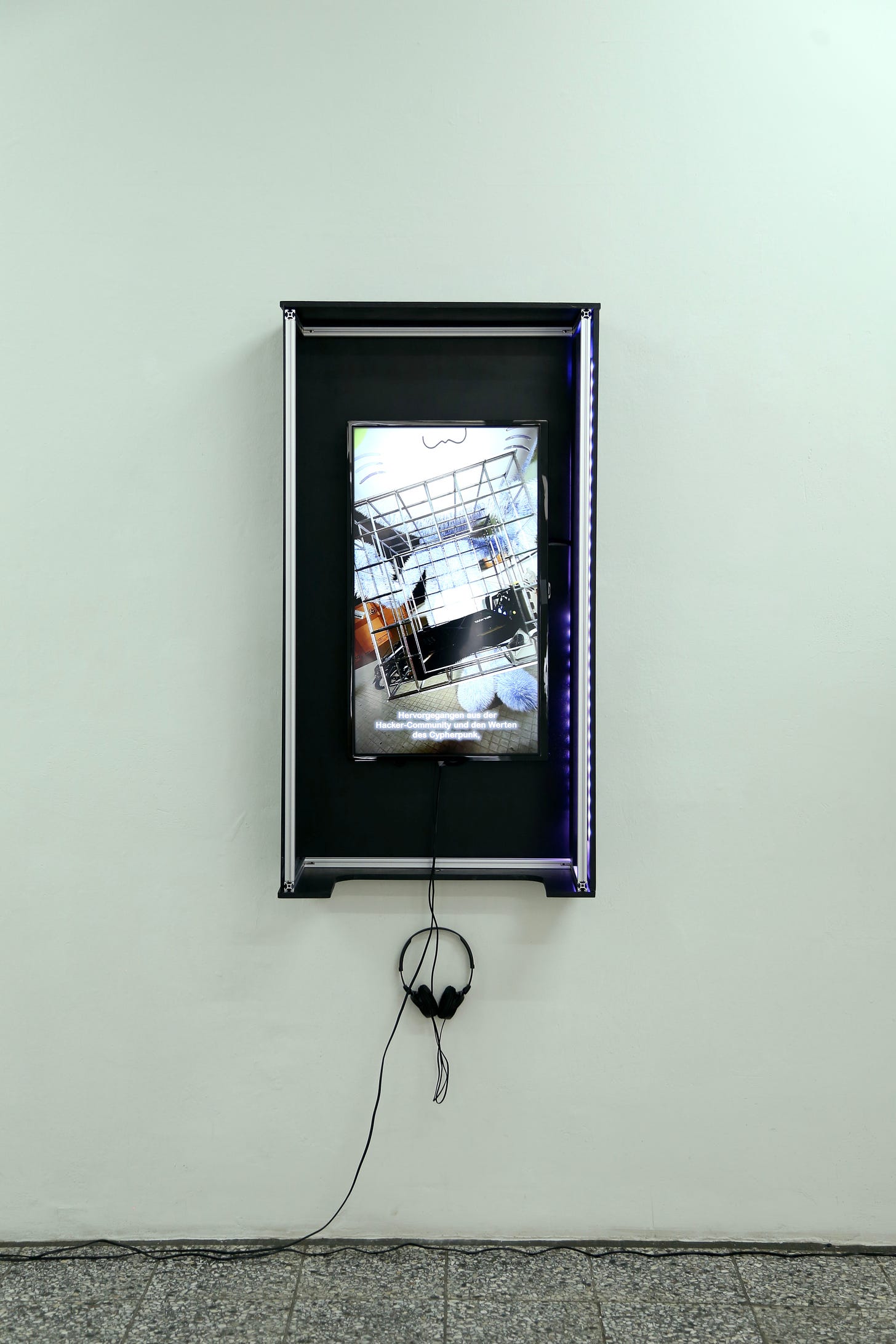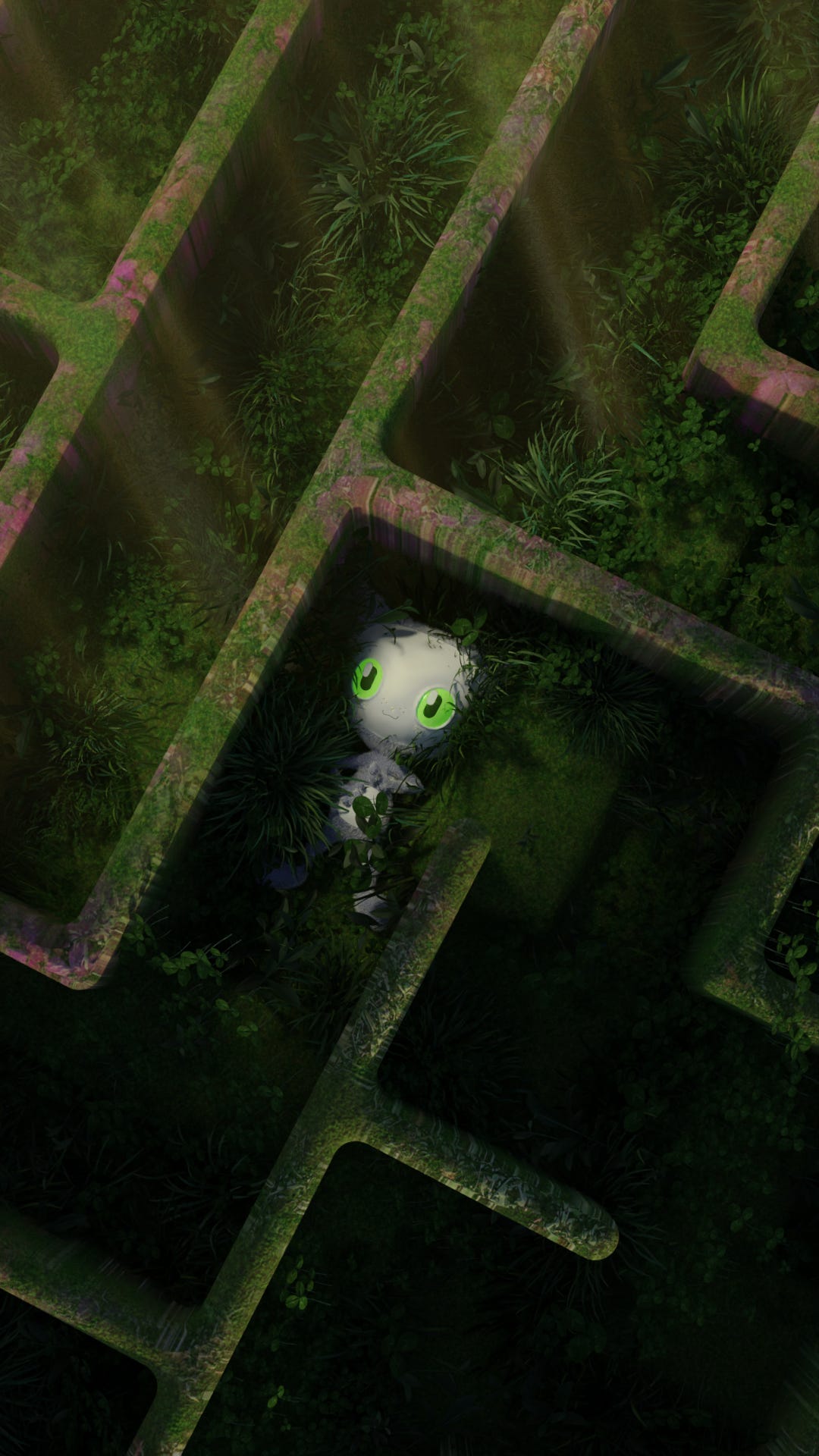Xtreme Girl
Lena Peplińska & Laura Radzewicz
Council+
A conversation with Laura Radzewicz and Lena Peplińska about their current work ‘‘All hardware sucks, all software sucks.’’ on view till April 20, 2024 at Council+, Berlin.
Meet Xtreme Girl, a storytelling tech–corporate mascot, that is attempting to decipher the causes of identitarian despair in a curated range of video essays. From the memoir of the internet before its platformization, through the critique of the corporate commodification of creative labor, to debunking the liberating potential of the decentralized Web 3.0, Xtreme Girl examines the political shifts caused by computation. Referring to hacker circles, crypto investors, nootropic dietary supplements, mythology, and green smoothies, Xtreme Girl attempts to map the late-capitalist landscape, hinting in her speculations to an anti-accelerationist stance.
Interview by Fay Chetwin
FC: Hi Lena, hi Laura! It’s a pleasure to sit down with you for this conversation. You recently have been taking part in a residency program initiated by Zeal Studios in Berlin, leading up to your exhibition at Council+ Gallery. Tell us about your project and how you spent the last three months in the studio.
XG: During the residency at Zeal Studios we have been developing a video series titled ‘’All hardware sucks, all software sucks.’’ It’s a research project investigating the decentralization and freedom of information. More precisely, we have developed three video essays that aim to reincarnate different ethea of Web decentralization. These three portraits mirror alterations in societal power structures that come with the advanced age of information. The work is presented and narrated by the Xtreme Girl – a cat character that we had brought to life with the founding of this project. Her appearance is inspired by tech start-up mascots, she has a big head and a very simple body. We like to think of her as the artist, instead of simply us.
FC: Can you elaborate the title of your work?
XG: The saying ’’All hardware sucks, all software sucks.’’ implements some relativity to technology. It hints to the general recognition of the fallibility of any computer system, ritually intoned as an attempt to quell incipient holy wars. It is a common response to anyone fanatically attached to a certain computer, language, operating system or tool. When discussing Wintel systems, however, it is often snidely appended with, ‘’but some suck more than others.’’ Out of a social perspective, Xtreme Girl is investigating which one sucks the least.
FC: What does the narration and development process of these videos look like? What is feeding your technical and creative thinking when you produce the work?
XG: Our work is mostly powered just purely by our own experience of being on the Web. When we look at the interface of our perfectly designed devices, we wonder about the gap between its potentially perfect technical predisposition and its capitalized and corrupt application. We can feel the machine in between these two states and are interested in challenging those forces – or at least the idea of those forces. Asides from being online, we do a lot of research of course, our theoretical stance is affiliated to media theorists such as McKenzie Wark or Richard Barbrook. We mainly investigate technologies and innovations that are encompassed by American culture, which is kind of funny because we’ve never been to America. But if you’re lucky, where you are geographically from completely loses significance if you grew up online.
FC: Can you elaborate how McKenzie Wark has been a point of reference to your work?
XG: We were really interested in McKenzie Warks ‘’Capital is dead’’ theory, which is a derivate of her previous hacker manifesto, but also other works such as Richard Barbrook’s ‘’California Ideology’’essay. McKenzie’s understanding of the vectoralists and the hackers emerging as the new classes within the informational society was a very formative idea to our work. Our three video essays and the corresponding figures we are portraying, are inherently located in that new class understanding. Whilst the hackers appear as a new productive class, the vectoralists are understood as the class that lords over globally commodified information and informational conduits. Both the figures embodied in our video essays as well as our own artistic entity Xtreme Girl feel much different in this new class understanding. It’s a refreshing yet tricky thought given the age of rising identity politics we live in.
FC: The term of the hacker has evolved a lot since the early Web. According to Xtreme Girl, what does it mean to be a hacker today?
XG: The term hacker, in the understanding of being the subject executing cybercrimes, used to be a term of dread driven by the interplay of late progressing capitalism and technology. In the understanding of our work however, a hacker is any generative worker that has to produce new data against the pressure of time. A hacker, not as an ill intentioned person who owns strict knowledge on programming, but rather just anyone who is producing different units of information on the basis of previous information. So any artist, designer, engineer, any poster, really, is a legitimate hacker. Hackerism as the data generative force of our time is Xtreme Girl’s core inspiration.
FC: What solutions, aside the simple claim of the decentralized Web 3.0, is the work looking for?
XG: The overarching hope is to save data, to acquire back self-agency and make the Web a safe place one can independently navigate through. Hope had been put on blockchain to overcome the ruling of centralized servers for long. The decentralization and freedom of information is an old idea and absurdly utopian at this point. We are interested in the possibilities that appear if we think the existing technology into a new framework, with a strong anti-accelerationist approach where more diverse voices are introduced into small scale ideation processes of these new structures. Xtreme Girl believes in the actual potentiality of progress and innovation within the age of circular progress. ‘’All hardware sucks, all software sucks’’ aims to shed light onto those very speculations. As artists we have the privilege to ask questions instead of coming up with perfect answers, so we like to think of the project as synthesizing knowledge into a meaningful and activating consumable way.
FC: You are a young duo invested in both deep theory and art practice – How do you two work together? How would you describe both of your roles within the entity of the Xtreme Girl?
XG: For ‘’All Hardware sucks, all software sucks’’ Laura was more working in the theoretical blockchain part and I (Lena) was rather researching for the hacker essay. Of course we have slightly different fields of expertise, also technically, but we try to do most of the work together, also because we try to avoid adapting structures of a company, we want to keep our ways of research and practice as natural as possible.
FC: In your work you often address the phenomena of techno-animism and its relation to conspiracy theories. Broadly summarized as the black box and spread all over our feeds, these are systems that are encouraging interaction without any knowledge of its integral workings. Could you explain how you see your relation as girl researchers to that phenomena? How much of Xtreme Girl is machinic and perhaps a product of its own to techno-animism?
XG: Debunking the black box is a silly idea, in a way, but it stems from genuine interest, as two girls that grew up in an age where the internet was corruptedly developing, we both formed our identity around what we consumed on the Web. We don’t see the black box as a transgression but rather like to come to peace with the reality of that force and develop curiosity for it. Denying it’s reality feels like resisting at the wrong place. Glitch feminism was definitely a notion that united us early on in the formation of the Xtreme Girl. To quote L. Russel (The Society Pages, 2013) ‘’In a society that conditions the public to find discomfort or outright fear in the errors and malfunctions of our socio-cultural mechanics—illicitly and implicitly encouraging an ethos of “Don’t rock the boat!”—a “glitch” becomes an apt metonym. Glitch Feminism, however, embraces the causality of “error”, and turns the gloomy implication of glitch on its ear by acknowledging that an error in a social system that has already been disturbed by economic, racial, social, sexual, and cultural stratification and the imperialist wrecking-ball of globalization—processes that continue to enact violence on all bodies—may not, in fact, be an error at all, but rather a much-needed erratum. This glitch is a correction to the “machine”, and, in turn, a positive departure." (L. Russell, The Society Pages, 2013). Techno Animis is both the synthesizing force that brought Xtreme Girl to life but at the same time also our matter of research.
FC: Alongside your exhibition, which is on view till April 20, you are planning to host a panel in Berlin. Tell us about it and how it responds or complements your show.
XG: The panel, with a grain of salt, is sort of parasiting on the idea of early start-up events, or early apple forums. In an Xtreme Girl entrepreneur-esque scene, we will be showing a selected range of evocative performance lectures related to our field of research. Xtreme Girl will be staging the artists and thinkers Kat Zavada, Aleksandra Skowronska and Aga Ant as well as musician szkoda. The works will be exploring pressing themes within the realm of post-net ideologies, rising digital monarchies and algorithmically mediated girl delusions. Of course we won’t leave out our most recent and hottest takes on Web decentralization.
The event will be taking place on April 13. at Betahaus Innospace Berlin. It will definitely be an important complementing part to our three video essays, that – in the frame of the exhibition – are exposed to a pretty short attention spam of the visitors. You can find the exact agenda for our panel on our IG page!
FC: Lastly, where do you see Xtreme Girl in the future? How can people best stay in touch with your work?
XG: We definitely want to stick to the format of video essays, and potentially also to complementing lecture performances – let’s see how we feel about it after our first launch. We’re also considering focusing on a selected phenomena or embodiment of the black box engine and creating a knowledge compendium or glossary on it. We’re committed to contributing to the general development of media literacy out of a comprehensive generation specific perspective. To stay in touch with ‘’All hardware sucks, all software sucks’’, but also with Xtreme Girl in general, you can follow us on instagram at xtremegrl_ – Amongst researching, we made use of time in the residency to finally launch our shared Instagram account, haha. There, we not only want to post news of our work but also share insights of our research that didn’t make it to the public surface of our work but are a crucial backbone to its production
“All hardware sucks, all software sucks’’ is on view till April 20. at Council+ Berlin, within a group show titled ‘’You are always at the beginning & always at the end’’.
‘’You are always at the beginning & always at the end’’ is the final exhibition of a 4 month residency program led by Zeal Studios, a self-initiated studio pivoting around the notion of networked technology in an increasingly fast changing world. The studio has been hosting and leading a 4-month residency program in Berlin for artists working in the realm of post-digital identity systems encompassed by various media landscapes. Amongst others, the residential artists critically engage with the topics of fan- and autofiction, technical imagination and post-historical spiritual practice. We are happy to welcome you at our exhibition at Council+ Berlin till April 20. featuring Laura Radzewicz, Lena Peplińska, Lea Dippold, Lisa Dieterle, Veronika Marxer and Vera Frommelt.
‘‘You are always at the beginning & always at the end’’ – Zeal Studios
Council+ Rathenower Str. 41, 10559 Berlin
28.03. - 13.04.




